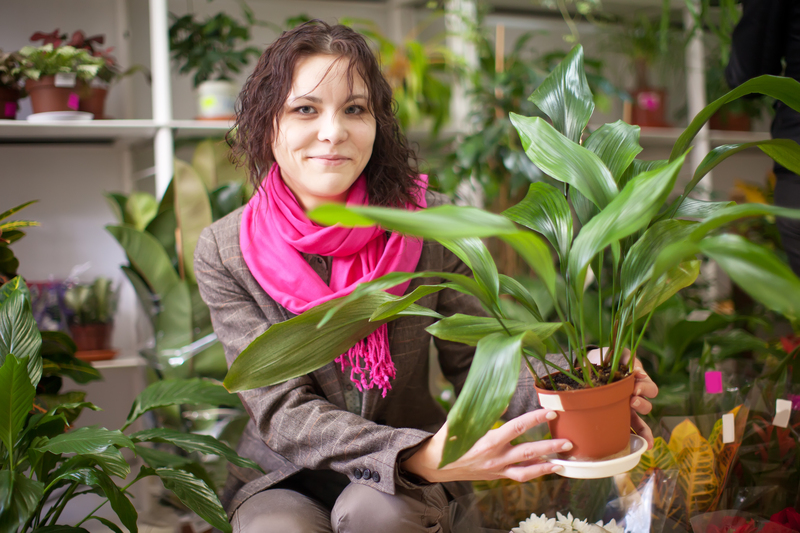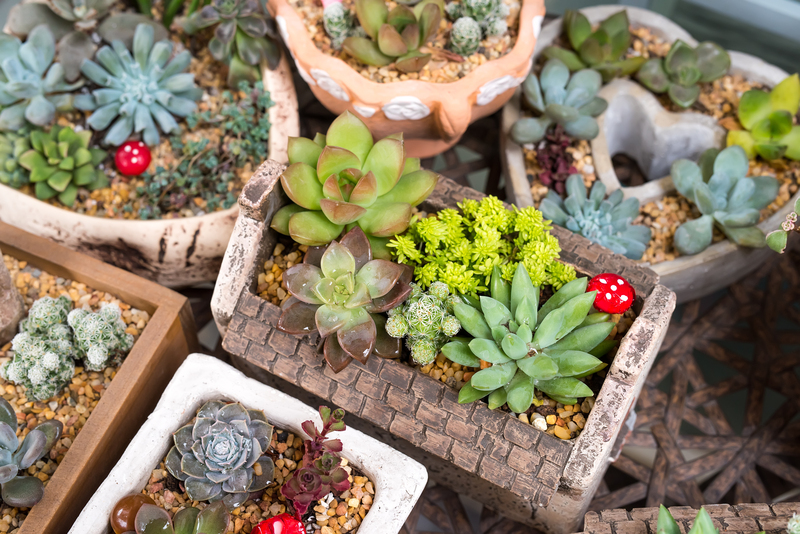Turn New Leaves: 9 Basic Gardening Essentials for Novices
Posted on 14/06/2025
Turn New Leaves: 9 Basic Gardening Essentials for Novices
Are you excited to delve into the world of gardening, but don't know where to start? Turning new leaves isn't just about cultivating plants--it's about nurturing patience, hope, and a little corner of nature within your space. For beginners, embarking on a gardening journey may seem overwhelming, but with the right essentials, you can transform your thumb from brown to green in no time. This comprehensive guide uncovers 9 basic gardening essentials for novices to ensure you cultivate a thriving garden, whether it's on your balcony, backyard, or windowsill.
Why Begin Gardening? The Rewards for Novices
Gardening offers more than just pretty blooms and fresh produce. Studies reveal that gardening reduces stress, boosts mental wellbeing, and provides moderate physical exercise. For beginners, the act of nurturing life fosters mindfulness and accomplishment. Additionally, you'll enjoy fresh herbs, vegetables, or flowers, making your meals tastier and your space more beautiful. With just a handful of gardening basics, you'll turn over new leaves--literally and figuratively!

The 9 Must-Have Gardening Essentials for Beginners
Ready to start? Below, you'll find an in-depth guide to the top nine essentials every novice gardener needs. These foundational tools and resources will help you avoid common pitfalls, promote healthy plant growth, and set you up for sustained gardening success.
1. Quality Gardening Gloves
Gardening gloves are a novice's best friend. No matter your skill level, protecting your hands is crucial. Gloves shield you from thorns, irritating sap, insects, and sharp tools. Look for breathable, water-resistant, and snug-fitting gloves. When shopping, opt for gloves with reinforced fingertips and palms for extra durability, and always wash them after use to maintain hygiene.
- Tip: For delicate work like planting seeds, use lightweight, fitted gloves for improved dexterity.
2. The Right Gardening Tools
A gardener is only as good as their tools. For new gardeners, investing in a basic set will make all the difference. Your starter kit should include:
- Trowel: For digging small holes, transplanting seedlings, and weeding.
- Hand fork: Essential for loosening soil and turning compost.
- Pruning shears: Keep your plants healthy by removing dead growth.
- Watering can or hose: Gentle, controlled watering is key for seedlings.
- Rake: Collect leaves and level your soil with ease.
Pro-tip: Choose tools with comfortable, ergonomic handles to prevent hand fatigue during longer sessions.
3. Quality Soil: The Foundation of a Healthy Garden
Soil quality is often underestimated by beginners. Healthy, nutrient-rich soil supports robust root development and vigorous growth. There are several types of soils, but for most beginner gardens, a high-quality potting mix is the best choice. If you're planting in the ground, test your soil's pH and amend as needed with compost or organic matter.
- Tip: Compost is nature's best soil amendment; it improves drainage, fertility, and structure.
4. Seeds and Starter Plants: Choosing What to Grow
Selecting easy-to-grow plants sets the stage for success. For beginners, start with resilient varieties such as herbs (basil, parsley), salad greens, tomatoes, or marigolds and zinnias for blooms. Buying young plants from the nursery gives a head start, while sowing seeds allows for a wider selection.
- Tip: Study the light and climate requirements printed on seed packets or plant tags.
5. Plant Containers and Raised Beds
Don't have a backyard? No problem! Containers and raised beds are perfect for balconies, patios, or small spaces. They offer excellent drainage and make it easier to control the soil quality.
- Choose containers with drainage holes to prevent soggy roots.
- Materials: Clay pots are porous and good for most plants; plastic pots are lightweight and retain moisture.
Idea: Get creative with upcycled containers such as old buckets, crates, or even boots!
6. Efficient Watering System
Consistent moisture is essential for robust plant health. Beginners often overwater or underwater, so investing in a simple watering system pays off. Options include:
- Watering cans with a fine rose to gently water seedlings
- Soaker hoses or drip irrigation systems for larger gardens or raised beds
Tip: Water early in the morning to minimize evaporation and fungal diseases.
7. Plant Labels and Garden Journal
Keeping track of your green journey is a gardener's secret weapon. Use plant labels to identify different varieties and their specific care needs. Starting a basic garden journal can help record what works (or doesn't!), watering schedules, and seasonal observations.
- Simple DIY: Use old popsicle sticks, stones, or wine corks as creative plant markers.
8. Sunlight: Placing Your Garden for Success
Plants need the right amount of sunlight to photosynthesize and thrive. Before you plant, observe your garden's sunlight patterns throughout the day.
- Full sun plants need 6-8 hours of direct sunlight
- Partial shade plants thrive with 3-6 hours
- Shade-loving varieties prefer less than 3 hours
Tip: Note that sunlight exposure changes across seasons; rearrange containers accordingly.
9. Patience and Perseverance: The Gardener's Mindset
Perhaps the most essential element a new gardener can possess is patience. Plants take time to grow and sometimes fail despite your best efforts. Embrace setbacks as valuable lessons, and celebrate every sprout, blossom, and harvest. Connect with other gardeners online or in your community for support, inspiration, and tips. Turning new leaves is as much about personal growth as it is about plant life!
Bonus: Helpful Resources for New Gardeners
To give your gardening journey the best possible start, tap into a wealth of available resources:
- Local garden centers: Staff offer region-specific advice.
- Online gardening communities: Join forums or social media groups to ask questions and share successes.
- Mobile apps: Use plant care apps to get reminders and identify problems.
- Books: Popular titles like "The Garden Primer" and "Epic Tomatoes" offer tried-and-true wisdom for beginners.
Getting Started: Step-by-Step Plan for Novice Gardeners
Ready to turn new leaves yourself? Here's a simple plan to get you growing:
- Pick your space: Choose a sunny windowsill, balcony, or plot in your yard.
- Assemble essentials: Gather the nine gardening basics above--quality gloves, tools, containers, labels, etc.
- Select easy plants: Start with herbs, salad greens, or hardy flowers.
- Prepare your soil: Fill containers or beds with compost-rich soil.
- Sow seeds or plant seedlings: Follow the instructions for depth, spacing, and sunlight needs.
- Water carefully: Aim for steady, moderate watering--avoid waterlogged soil.
- Label and journal: Mark what you've planted and note first sprouts in your gardening diary.
- Monitor sunlight: Move containers or prune back overhangs for optimal light.
- Stay patient and learn: Reap the rewards of persistence--growth for your plants and yourself.
Encouragement for Novice Gardeners: Turning Over New Leaves
As you embark on this journey, remember that every seasoned gardener was once a beginner. There's no substitute for hands-on experience--don't be afraid to make mistakes! With the right gardening essentials, a bit of preparation, and lots of curiosity, you'll cultivate a space that brings joy, relaxation, and beauty. Nurture your garden, watch it flourish, and soon, turning new leaves will become second nature.
Happy gardening!

Frequently Asked Questions: Gardening for Newbies
What are the easiest plants for beginners to grow?
Herbs such as basil, mint, and parsley, salad greens like lettuce and spinach, and flowers like marigolds, zinnias, and sunflowers are forgiving and fast-growing, offering early rewards and building confidence.
How often should I water my new garden?
Watering needs vary by plant, soil type, and climate. As a rule of thumb, check the top inch of soil; if it's dry, it's time to water. Avoid daily overwatering--plants need damp, not soggy, roots.
Why do my plants keep dying?
Common reasons include over/underwatering, poor soil, insufficient sunlight, or pest infestations. Begin with small-scale experiments, and don't be afraid to ask for help or consult instructional resources.
Conclusion: Transforming Your Life by Turning New Leaves
By equipping yourself with these nine gardening essentials for beginners, you're not only laying the foundation of a healthy, lush garden--you're embracing a rewarding, therapeutic hobby that enhances every aspect of your life. Whether you're dreaming of homegrown vegetables, vibrant flowerbeds, or simply a greener space to unwind, your journey starts now. Remember, every great gardener once had empty pots, bare soil, and a heart full of hope. Turn new leaves, and let the joys of nurturing life fill your days!
Latest Posts
Innovative Ideas to Shield Your Garden from Weather Threats
Foster nature's beauty with orchid knowledge
Hedge Artistry: Perfect Shapes and Techniques for Every Gardener

